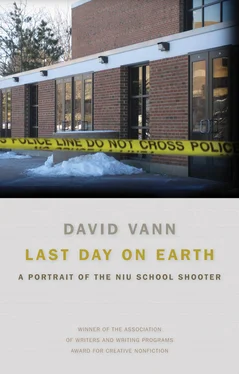By February 1, 2000, though, Thresholds decides somehow that Steve has things together enough to transition out of the residence day program into an SRO, a single room occupancy. He has his own room in a crappy building, and they all share a bathroom.
This is an even worse neighborhood. “His first night in the SRO was rough,” says Jessica Baty, the person who will come to know him best in later years, his girlfriend and confessor. “I remember him telling me about how he heard gunshots and someone was pounding on his door, thinking that Steven was the previous occupant. Steven said that he put furniture in front of the door.” He doesn’t sleep. He hides in a corner and fears for his life.
They place him in a job at Walgreens, but he’s fired after a month, on April 17, 2000, for poor attendance. He’s hired at Osco, a pharmacy, in June, but he’s self-conscious, decides to go off his meds to lose weight. He starts having hallucinations of his ex-girlfriend again. At noon on June 13, he overdoses on twenty Effexor. A social worker wakes him at 1:30 p.m., drives him to work, but by 6:00 p.m., his break time, he feels so bad he goes to the hospital. They keep him on for another month at Osco, then fire him.
Steve is angry all the time, and paranoid. He isn’t hearing voices anymore, but he has to check doors over and over, and touch things. The physical world is a torture of meaning. Threes speak to him, almost prophetically, tell him what to do.
In August, he goes on vacation with his family to Wisconsin. He gets angry, is impatient, impulsive, and he’s too sedated. He and his mother meet with a psychiatrist at the end of August, and they talk about the meds. He’s not actively psychotic anymore, so they adjust the meds a bit, though he’s still on Prozac, Depakote, Seroquel, and Clozaril. He becomes a bit less sleepy.
Steve starts work at K-Mart in September. He thinks people are following him, that they’re against him, ganging up. He gets in arguments with his coworkers, anxious and emotional. He’s working a night job at UPS, too, but he quits that because it’s too physically demanding. He’s feeling sleepy during the daytime but getting used to it.
He wakes up one morning and he’s wet the bed. This freaks him out, but he tries to hide it. It happens again, and again, six or seven times. He’s a bed wetter now, on top of everything else. They reduce the Clozaril, and that helps. He chooses more Seroquel and less Clozaril, even though it will make him sleepier. He can’t be a bed wetter. He’d rather be a zombie.
He visits his sister in October at the University of Illinois, and he’s determined to enroll there next fall. In the meantime, he’ll enroll at Truman College and get a couple courses under his belt. Maybe it’s seeing people his age who are happy. People his age who aren’t drugged out all the time. But at this point something seems to click in Steve. He’s going to get out of here and do something with his life. He’s not as drowsy anymore, but he uses three alarm clocks just to make sure he wakes up each day.
Steve loses his K-Mart job in November when he breaks his hand. It’s in a group session, on November 6, 2000, and Steve feels another resident has insulted him, so he bumps him in the smoking area when the guy tries to block the door. The guy hits Steve in the face, then Steve breaks his hand hitting the guy several times in the head.
This isn’t Steve’s first fight. He reports to his therapist that he was beaten up “a lot” in high school, that he was often the subject of jokes and insults. And he pulled a knife on Adam that one time after the “wiretap.” But what is his history of violence exactly? When does it begin, and how, and with whom? And how did he feel about fighting? Did he like it? He never talks about it in later years, doesn’t write anything. But it shows a certain level of commitment to hit someone hard enough to break your hand, and hitting someone in the head shows intention clearly enough. Was he willing already to kill?
Steve looks forward to Thanksgiving with his family, four days at home, but it goes terribly. His sister tells him she hates him. His mother sends him away early. Then, when he tries to just pick up his money and cigarettes from the therapist, he gets blamed for everything. He tells them to fuck off, he’ll leave the program and doesn’t need therapy.
A few days later, though, he’s contrite. He wants back in, sets up a therapy appointment. And he follows through with his plans for school, enrolls at Truman, a two-year community college, for several classes in January.
Steve charges ahead with school. He wants to succeed, wants to leave his psycho years behind. His therapists warn him that getting overinvolved in school and ignoring his mental health issues will lead to a “hard crash” that will undo everything he’s accomplished. But Steve wants out of the system, finds ways to end this period of his life. He weans himself off his meds at the end of January 2001, and he hides this fact for five months in order to still collect his money. They believe he’s still taking the pills. He reports nonexistent side-effects, begins living a double life. They think they still have him, but he’s on his way out. He gets them annoyed enough they won’t even want him. He humiliates a woman on the staff by playing music with sexually explicit lyrics. He quits seeing his therapist, shaves his head. He tattoos FTW, “Fuck The World,” on his own skin. He complains about noise and sleeping, so they have to move him around.
Steve moves out and gets his own apartment on June 21. He breaks the news of the five-month lie to his case manager the next day. With pleasure. On June 29 they meet again, and Steve says he did fine without the meds. His case manager points out that over the last five and a half months, Steve has “held one job for three and a half weeks, quit school without earning credit, tattooed himself, continued to have no friends, and quit therapy, the job club, and the college support program.” But he also says something else: he suggests they expedite Steve’s discharge, since he’s not willing to work with them anymore. Steve wants out of Thresholds, and now they want him to go.
Steve becomes the Chicago Department of Public Health’s problem. They do an extensive evaluation, which isn’t easy to do. “Client is a poor reporter of his past/current situation,” they write, and indeed he is. He lies and hides constantly. Of his suicide attempts by cutting and overdose, “client states he did these for attention, that he learned this from peers in residential placements.” But they know he was making the attempts in high school, before Mary Hill. “Client has not taken psych meds for six months, says he learned to wean himself off, feels better, stable now.” They don’t trust this, either, and they generally just don’t like his low motivation for seeking help. “Every time I have a therapist, it ends up bad,” he says. He finds therapists annoying. “Same old questions. . how are you feeling, etc.”
They do get Steve to talk about his past and his family. He says his sister, Susan, “wants to repress men,” admits his grandfather’s alcoholism, and admits he had a difficult childhood, was the “butt of jokes” and “beat up a lot in school.” Still, though, the Chicago Department of Public Health decides they just can’t handle him, and they determine that his family can afford private services. But Steve fixes the problem. He applies to the Army on September 5, 2001.
Steve needs this. So he checks “no” on his application for suicide attempts. No, also, for “evaluated or treated for a mental condition,” “used illegal drugs or abused prescription drugs,” “depression or excessive worry,” “received counseling of any type,” “frequent trouble sleeping,” and “anxiety or panic attacks.” They give him a $4,000 cash bonus and sign him up for the Army College Fund.
Читать дальше












